Attached files
| file | filename |
|---|---|
| 8-K - FORM 8-K - AMYLIN PHARMACEUTICALS INC | d8k.htm |
Exhibit 99.1
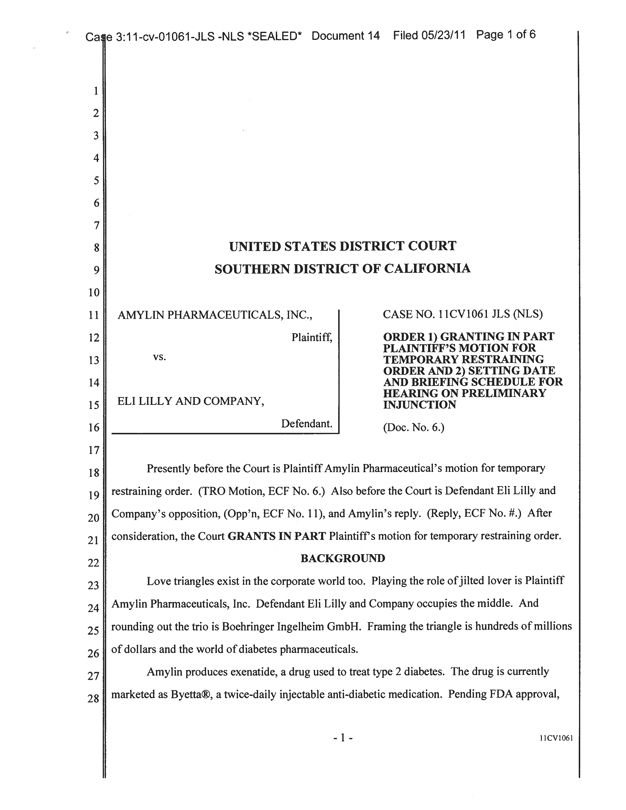
Case 3:11-cv-01061-JLS-NLS *SEALED* Document 14 Filed 05/23/11 Page 1 of 6
UNITED STATES DISTRICT COURT SOUTHERN DISTRICT OF CALIFORNIA
AMYLIN PHARMACEUTICALS, INC.,
Plaintiff,
vs.
ELI LILLY AND COMPANY, Defendant.
CASE NO. 11CV1061 JLS (NLS)
ORDER 1) GRANTING IN PART PLAINTIFF’S MOTION FOR TEMPORARY RESTRAINING ORDER AND 2) SETTING DATE AND BRIEFING SCHEDULE FOR HEARING ON PRELIMINARY INJUNCTION
(Doc. No. 6.)
Presently before the Court is Plaintiff Amylin Pharmaceutical’s motion for temporary restraining order. (TRO Motion, ECF No. 6.) Also before the Court is Defendant Eli Lilly and Company’s opposition, (Opp’n, ECF No. 11), and Amylin’s reply. (Reply, ECF No. #.) After consideration, the Court GRANTS IN PART Plaintiffs motion for temporary restraining order.
BACKGROUND
Love triangles exist in the corporate world too. Playing the role of jilted lover is Plaintiff Amylin Pharmaceuticals, Inc. Defendant Eli Lilly and Company occupies the middle. And rounding out the trio is Boehringer Ingelheim GmbH. Framing the triangle is hundreds of millions of dollars and the world of diabetes Pharmaceuticals.
Amylin produces exenatide, a drug used to treat type 2 diabetes. The drug is currently marketed as Byetta®, a twice-daily injectable anti-diabetic medication. Pending FDA approval,
- 1 -
1
2
3
4
5
6
7
8
9
10
11
12
13
14
15
16
17
18
19
20
21
22
23
24
25
26
27
28
11CV1061
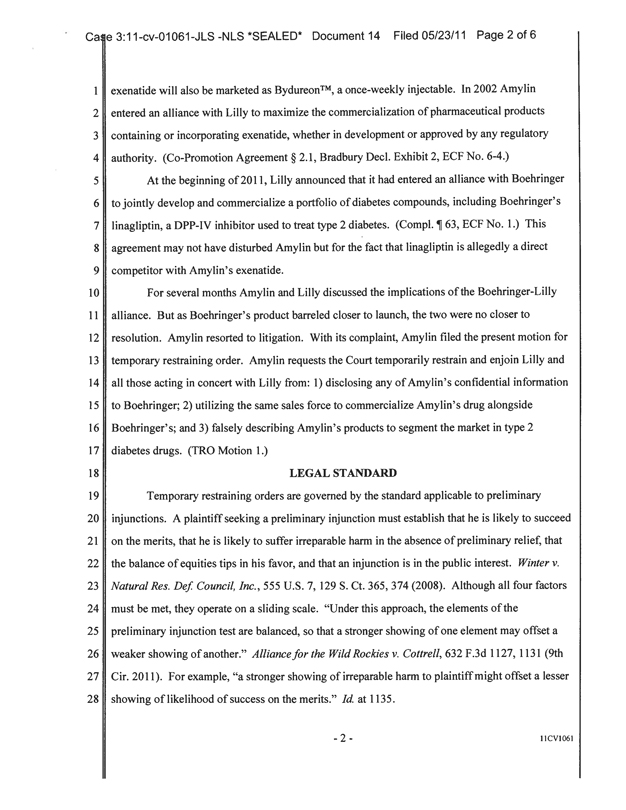
Case3:11-cv-01061-JLS-NLS *SEALED* Document 14 Filed 05/23/11 Page 2 of 6
exenatide will also be marketed as Bydureon™, a once-weekly injectable. In 2002 Amylin entered an alliance with Lilly to maximize the commercialization of pharmaceutical products containing or incorporating exenatide, whether in development or approved by any regulatory authority. (Co-Promotion Agreement § 2.1, Bradbury Decl. Exhibit 2, ECF No. 6-4.)
At the beginning of 2011, Lilly announced that it had entered an alliance with Boehringer to jointly develop and commercialize a portfolio of diabetes compounds, including Boehringer’s linagliptin, a DPP-IV inhibitor used to treat type 2 diabetes. (Compl. U 63, ECF No. 1.) This agreement may not have disturbed Amylin but for the fact that linagliptin is allegedly a direct competitor with Amylin’s exenatide.
For several months Amylin and Lilly discussed the implications of the Boehringer-Lilly alliance. But as Boehringer’s product barreled closer to launch, the two were no closer to resolution. Amylin resorted to litigation. With its complaint, Amylin filed the present motion for temporary restraining order. Amylin requests the Court temporarily restrain and enjoin Lilly and all those acting in concert with Lilly from: 1) disclosing any of Amylin’s confidential information to Boehringer; 2) utilizing the same sales force to commercialize Amylin’s drug alongside Boehringer’s; and 3) falsely describing Amylin’s products to segment the market in type 2 diabetes drugs. (TRO Motion 1.)
LEGAL STANDARD
Temporary restraining orders are governed by the standard applicable to preliminary injunctions. A plaintiff seeking a preliminary injunction must establish that he is likely to succeed on the merits, that he is likely to suffer irreparable harm in the absence of preliminary relief, that the balance of equities tips in his favor, and that an injunction is in the public interest. Winter v. Natural Res. Def. Council, Inc., 555 U.S. 7, 129 S. Ct. 365, 374 (2008). Although all four factors must be met, they operate on a sliding scale. “Under this approach, the elements of the preliminary injunction test are balanced, so that a stronger showing of one element may offset a weaker showing of another.” Alliance for the Wild Rockies v. Cottrell, 632 F.3d 1127, 1131 (9th Cir. 2011). For example, “a stronger showing of irreparable harm to plaintiff might offset a lesser showing of likelihood of success on the merits.” Id. at 1135.
- 2 -
1
2
3
4
5
6
7
8
9
10
11
12
13
14
15
16
17
18
19
20
21
22
23
24
25
26
27
28
11CV1061
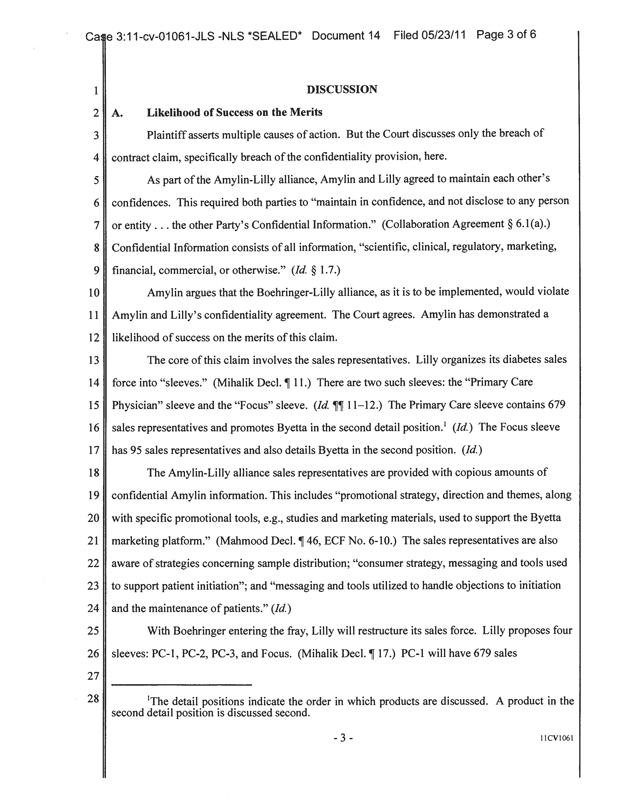
Case3:11-cv-01061-JLS-NLS *SEALED* Document 14 Filed 05/23/11 Page 3 of 6
DISCUSSION
A. Likelihood of Success on the Merits
Plaintiff asserts multiple causes of action. But the Court discusses only the breach of contract claim, specifically breach of the confidentiality provision, here.
As part of the Amylin-Lilly alliance, Amylin and Lilly agreed to maintain each other’s confidences. This required both parties to “maintain in confidence, and not disclose to any person or entity . the other Party’s Confidential Information.” (Collaboration Agreement § 6.1 (a).) Confidential Information consists of all information, “scientific, clinical, regulatory, marketing, financial, commercial, or otherwise.” (Id. § 1.7.)
Amylin argues that the Boehringer-Lilly alliance, as it is to be implemented, would violate Amylin and Lilly’s confidentiality agreement. The Court agrees. Amylin has demonstrated a likelihood of success on the merits of this claim.
The core of this claim involves the sales representatives. Lilly organizes its diabetes sales force into “sleeves.” (Mihalik Decl. 11.) There are two such sleeves: the “Primary Care Physician” sleeve and the “Focus” sleeve. (Id. 11-12.) The Primary Care sleeve contains 679 sales representatives and promotes Byetta in the second detail position.1 (Id.) The Focus sleeve has 95 sales representatives and also details Byetta in the second position. (Id.)
The Amylin-Lilly alliance sales representatives are provided with copious amounts of confidential Amylin information. This includes “promotional strategy, direction and themes, along with specific promotional tools, e.g., studies and marketing materials, used to support the Byetta marketing platform.” (Mahmood Decl. 46, ECF No. 6-10.) The sales representatives are also aware of strategies concerning sample distribution; “consumer strategy, messaging and tools used to support patient initiation”; and “messaging and tools utilized to handle objections to initiation and the maintenance of patients.” (Id.)
With Boehringer entering the fray, Lilly will restructure its sales force. Lilly proposes four sleeves: PC-1, PC-2, PC-3, and Focus. (Mihalik Decl.17.) PC-1 will have 679 sales
1 The detail positions indicate the order in which products are discussed. A product in the second detail position is discussed second.
- 3 -
1
2
3
4
5
6
7
8
9
10
11
12
13
14
15
16
17
18
19
20
21
22
23
24
25
26
27
28
11CV1061
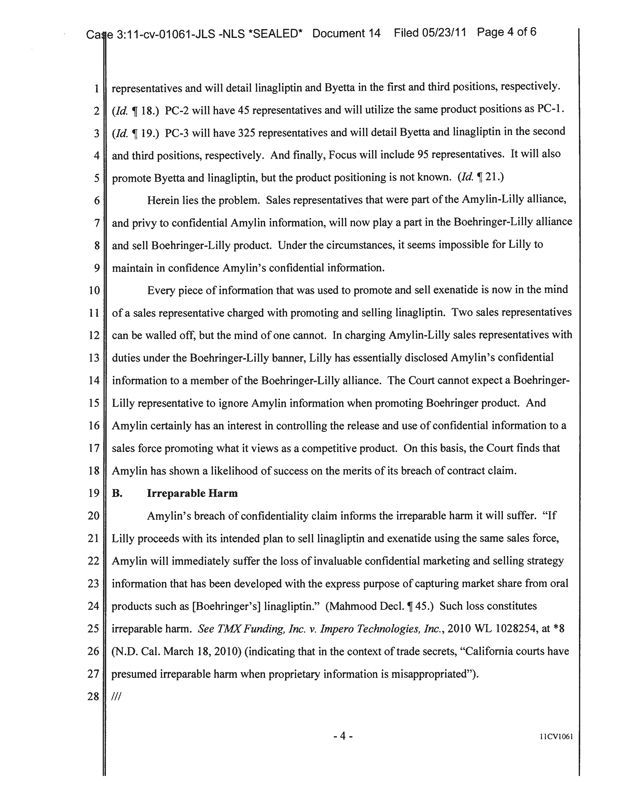
Case3:11-cv-01061-JLS-NLS *SEALED* Document 14 Filed 05/23/11 Page 4 of 6
representatives and will detail linagliptin and Byetta in the first and third positions, respectively. (Id. 18.) PC-2 will have 45 representatives and will utilize the same product positions as PC-1. (Id. 19.) PC-3 will have 325 representatives and will detail Byetta and linagliptin in the second and third positions, respectively. And finally, Focus will include 95 representatives. It will also promote Byetta and linagliptin, but the product positioning is not known. (Id. 21.)
Herein lies the problem. Sales representatives that were part of the Amylin-Lilly alliance, and privy to confidential Amylin information, will now play a part in the Boehringer-Lilly alliance and sell Boehringer-Lilly product. Under the circumstances, it seems impossible for Lilly to maintain in confidence Amylin’s confidential information.
Every piece of information that was used to promote and sell exenatide is now in the mind of a sales representative charged with promoting and selling linagliptin. Two sales representatives can be walled off, but the mind of one cannot. In charging Amylin-Lilly sales representatives with duties under the Boehringer-Lilly banner, Lilly has essentially disclosed Amylin’s confidential information to a member of the Boehringer-Lilly alliance. The Court cannot expect a Boehringer-Lilly representative to ignore Amylin information when promoting Boehringer product. And Amylin certainly has an interest in controlling the release and use of confidential information to a sales force promoting what it views as a competitive product. On this basis, the Court finds that Amylin has shown a likelihood of success on the merits of its breach of contract claim. B. Irreparable Harm
Amylin’s breach of confidentiality claim informs the irreparable harm it will suffer. “If Lilly proceeds with its intended plan to sell linagliptin and exenatide using the same sales force, Amylin will immediately suffer the loss of invaluable confidential marketing and selling strategy information that has been developed with the express purpose of capturing market share from oral products such as [Boehringer’s] linagliptin.” (Mahmood Decl. 45.) Such loss constitutes irreparable harm. See TMX Funding, Inc. v. Impero Technologies, Inc., 2010 WL 1028254, at *8 (N.D. Cal. March 18, 2010) (indicating that in the context of trade secrets, “California courts have
presumed irreparable harm when proprietary information is misappropriated”).
///
- 4 -
1
2
3
4
5
6
7
8
9
10
11
12
13
14
15
16
17
18
19
20
21
22
23
24
25
26
27
28
11CV1061
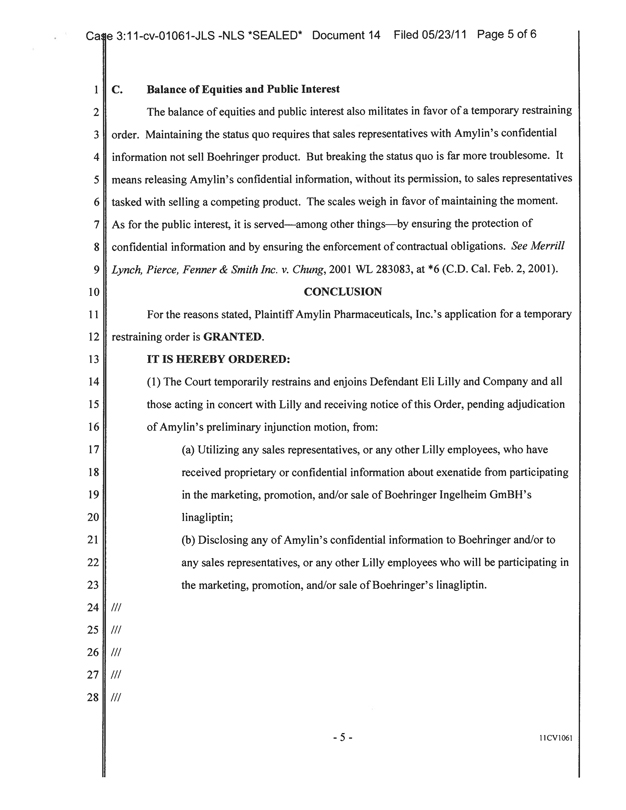
Case3:11-cv-01061-JLS-NLS *SEALED* Document 14 Filed 05/23/11 Page 5 of 6
C. Balance of Equities and Public Interest
The balance of equities and public interest also militates in favor of a temporary restraining order. Maintaining the status quo requires that sales representatives with Amylin’s confidential information not sell Boehringer product. But breaking the status quo is far more troublesome. It means releasing Amylin’s confidential information, without its permission, to sales representatives tasked with selling a competing product. The scales weigh in favor of maintaining the moment. As for the public interest, it is served—among other things—by ensuring the protection of confidential information and by ensuring the enforcement of contractual obligations. See Merrill Lynch, Pierce, Fenner & Smith Inc. v. Chung, 2001 WL 283083, at *6 (C.D. Cal. Feb. 2, 2001).
CONCLUSION
For the reasons stated, Plaintiff Amylin Pharmaceuticals, Inc.’s application for a temporary restraining order is GRANTED.
IT IS HEREBY ORDERED:
(1) The Court temporarily restrains and enjoins Defendant Eli Lilly and Company and all those acting in concert with Lilly and receiving notice of this Order, pending adjudication of Amylin’s preliminary injunction motion, from:
(a) Utilizing any sales representatives, or any other Lilly employees, who have received proprietary or confidential information about exenatide from participating in the marketing, promotion, and/or sale of Boehringer Ingelheim GmBH’s linagliptin;
(b) Disclosing any of Amylin’s confidential information to Boehringer and/or to any sales representatives, or any other Lilly employees who will be participating in the marketing, promotion, and/or sale of Boehringer’s linagliptin.
///
///
///
///
///
///
- 5 -
1
2
3
4
5
6
7
8
9
10
11
12
13
14
15
16
17
18
19
20
21
22
23
24
25
26
27
28
11CV1061
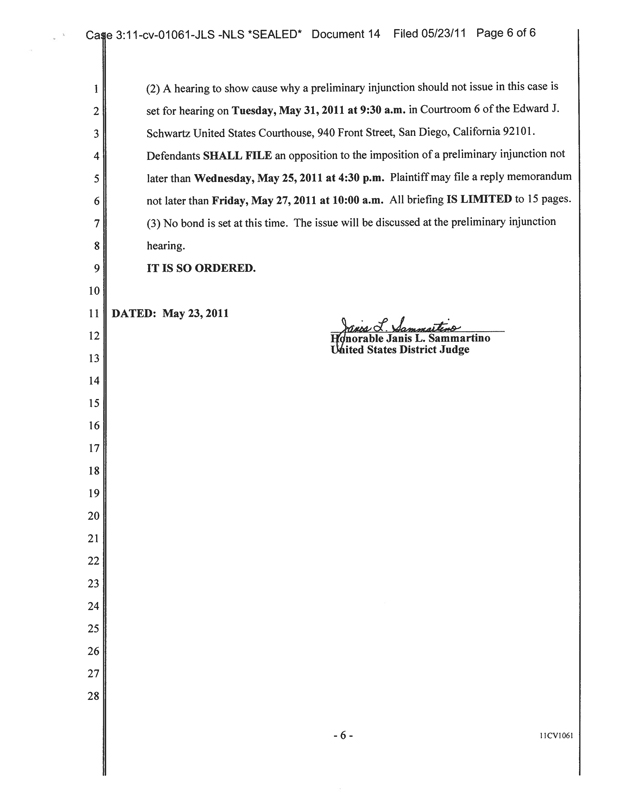
Case3:11-cv-01061-JLS-NLS *SEALED* Document 14 Filed 05/23/11 Page 6 of 6
(2) A hearing to show cause why a preliminary injunction should not issue in this case is set for hearing on Tuesday, May 31, 2011 at 9:30 a.m. in Courtroom 6 of the Edward J. Schwartz United States Courthouse, 940 Front Street, San Diego, California 92101. Defendants SHALL FILE an opposition to the imposition of a preliminary injunction not later than Wednesday, May 25, 2011 at 4:30 p.m. Plaintiff may file a reply memorandum not later than Friday, May 27, 2011 at 10:00 a.m. All briefing IS LIMITED to 15 pages.
(3) No bond is set at this time. The issue will be discussed at the preliminary injunction hearing.
IT IS SO ORDERED.
DATED: May 23, 2011
/s/ Janis L. Sammartino
Honorable Janis L. Sammartino United States District Judge
- 6 -
1
2
3
4
5
6
7
8
9
10
11
12
13
14
15
16
17
18
19
20
21
22
23
24
25
26
27
28
11CV1061
